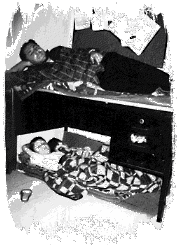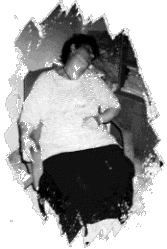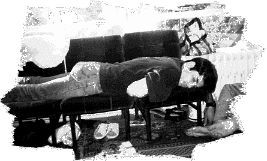Iranian Refugees' Alliance Quarterly Newsletter
(Spring 96/ Summer 96)
On June 28 1996, around midnight, Turkish foreigners police attempted to round up more than 80 Iranian asylum seekers who were still participating in a protest sit-in in Ankara staged in August of 1995. At the time, ten adults were on the 25th day of a protest hunger strike at the office of the Human Rights Association and the rest of the participants, including more than 30 children, were residing at one of the offices of the Freedom and Solidarity Party, the main site of the sit-in.
As a result of the attack by the Turkish police, the site of the sit-in was emptied and as reported by the steering committee of the sit-in, 41 of the sit-in participants were detained and returned to their towns of prior residence. Local authorities have issued the returned asylum seekers three month extensions of stay in Turkey. The rest of the people live in hiding and are afraid to approach the authorities because they fear deportation. A week before the Turkish police attacked the site of the sit-in, 6 participants while grocery shopping for the group at a nearby store, were arrested and returned to their former towns of residence. All but one participant, Karim Shahrashoub, escaped and returned to the site of the sit-in in Ankara.

|
 |

|
Shahrashub received a deportation notice immediately after reaching his town of prior residence and was subsequently taken to the border town of Agri and deported to Iran.
In the past 11 months despite continuos threats to disperse and deport the sit-in participants, Turkish authorities have refrained from any actions against the group. During this time, those participants who were arrested outside the site of the sit-in were released shortly after. So has been the case in two occasions where the entire sit-in group was arrested, after staging demonstrations against the Iranian government. However, the deportation of Karim Shahrashub, the first sit-in participant deported by the Turkish authorities, is an alarm that the return of the rest of the sit-in participants to their towns of prior residence and the extension of their stay permits for 3 months, may be a precursor to their eventual deportation.
International organizations such as the Canadian Council for refugees, Jesuit Refugee Service, and US Committee for Refugees (USCR) have appealed to both the Turkish government and UNHCR to seek a humanitarian resolution of the sit-in.
While the pressure by the sit-in participants and supporting groups convinced the Turkish authorities to reprieve the deportation orders in practice, until the recent round up both the Ankara Branch of the UNHCR and the Geneva Headquarters refused any form of assistance to the sit-in participants.
International standards require, at minimum, safeguards such as the right for the refugee applicant to be informed of the grounds for the rejection, to receive legal advice and representation, and to have a full and fair hearing in order to produce truly fair decisions.
As far as the sit-in refugee claims have been concerned, UNHCR has never met the legitimate burden-bearing on any refugee adjudicating body-of showing that the determination procedure it had used previously for assessing the claims of the sit-in protesters has conformed to these standards. In fact, the refugee determination procedure used by the UNHCR Ankara Branch has been seriously criticized in the past. In a May 1995 report titled "Evading Scrutiny: Does UNHCR Determination System Measure up to International Standards?", Iranian Refugees Alliance has enumerated serious deficiencies in the UNHCR determination procedure.These deficiencies increase the risk of error in the initial determination of the refugee claims of the sit-in participants as well as the review decisions for those who have had appeals.
Despite compelling evidence regarding hostile views and reactions of the Iranian regime toward the sit-in, UNHCR has also refused to re-assess the claims of the sit-in participants based on their new condition. In Iran, people who oppose or are suspected of opposing the government risk serious human rights violations including torture and the death penalty.
In one publicized commentary broadcasted by the Islamic Republic News Agency in February 1996, the Iranian deputy foreign minister for Asia-Pacific affairs, referred to the sit-in participants as "a group of hypocrite grouplets". This Iranian official strongly protested "the unacceptable activities and anti-Islamic measures" taken by the sit-in group in Turkey, referring to a demonstration staged against the Islamic Republic of Iran on the 17th anniversary of the victory of the Islamic revolution. In April 1995, Saeed Rejaie, an Assembly representative of the Islamic Republic of Iran, in response to questions asked by a Turkish reporter referred to the sit-in participants as "subversive traitors".
During the past 11 months UNHCR has not considered any other humanitarian solutions for the sit-in group.
Although diplomatic relations between Turkey and Iran have deteriorated in the past several months, the number of deportations has increased. Recently, Amnesty International has expressed fears that Turkey may be expelling Iranian asylum-seekers and refugees to improve relations under a security agreement with Iran, which reportedly includes the reciprocal exchange of opposition activists. In April 1995, Evrensil, a Turkish newspaper reported that the reciprocal exchange of the P.K.K. members residing in Iran and the Iranian dissident asylum seekers residing in Turkey was officially confirmed by an Iranian authority.
In early July 1996, Turkey's Islamist-led government of Prime Minister Necmettin Erbakan (Welfare Party) won a vote of confidence in Parliament. Many fear that in its zeal to improve relations with Iran's Islamic government, Turkey would vigorously pursue previous agreements on reciprocal exchange of political dissidents seeking asylum in both countries.
One of these program is Australia's Refugee & Special Humanitarian Program. All sit-in applicants have applied to this program, but several of them do not have eligible sponsors in Australia-an important element for admission. Iranian Refugees' Alliance has worked to find stronger connections for these sponsorships, and assist admitted applicants financially for medical examinations and plane fares.
A second solution is the Private Sponsorship of Refugees in Canada. This is a program that enables eligible individuals and organizations to request that an overseas Visa Officer interview a named refugee for resettling in Canada. Applicants are required to meet both refugee criteria and admissibility criteria which has to do with the ability to successfully establish oneself in Canada. If a refugee's claim is accepted, the sponsor should provide basic emotional and financial support for up to a year to enable the refugee to adjust and settle in Canada. Iranian Refugees' Alliance has been trying to form partnerships with eligible sponsors in Canada which has so far resulted in sponsorships for 16 families. We are working to provide sponsorships for more sit-in families within the next three months. (see article Creative Partnership for a Life-saving Opportunity).
Iranian Refugees' Alliance asked the UNHCR to seek guarantees from the Turkish authorities ensuing that sit-in participants would not be deported to Iran, and to urge the Turkish authorities to grant the sit-in people extension permits for as long as their applications are pending, for a maximum of 3 years. We also requested that UNHCR consult with the two viable programs on expediting the process, and using fair and generous standards. In a statement issued on July 8, 1996, UNHCR for the first time considered sit-in participants to fall under a "special humanitarian status." The statement also reports that UNHCR has obtained the agreement of the Government of Turkey to extend their residence permits for a possible 6 months. Although UNHCR still refuses assistance on resettling the sit-in participants Iranian Refugees' Alliance welcomes the agency's new position of protecting the sit-in participants against deportation as a sign of progress. However, in light of the new alarming political situation in Turkey, Iranian Refugees' Alliance calls on the UNHCR to foresee possible deals between Iran and Turkey for reciprocal exchange of opposition activists. Under such circumstances the only protection for sit-in people would be urgent resettlement in a third country.

UNHCR deplores the public demonstrations which have been used by the members of this sit-in group to try to gain recognition as refugees in Turkey after such status was not granted to them on the basis of their previous circumstances in Iran. Such tactics complicate the task of protecting refugees who need temporary asylum in turkey. UNHCR will not submit the cases of sit-in group members to resettlement countries. However, in the absence of specific guarantees of safe return from the Government of Iran UNHCR has considered them to fall under a special humanitarian status and has obtained the agreement of the Government of Turkey to exceptionally extend their residence permits.
The organizations which have advised and encouraged these rejected asylum- seekers from the beginning of their sit-in now bear a special responsibility to help them find a solution through consular channels or immigration or humanitarian programmes. The efforts which until now have been directed at influencing UNHCR's eligibility decisions should be invested in securing these other solutions for the group members. Meanwhile it is important that the individuals and families concerned should be advised to respect the requirements of the residence permits which have been given to them by the Government of Turkey.
UNHCR Branch Office Ankara
8 July, 1996